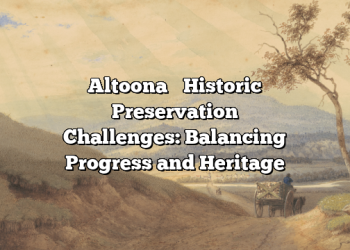Introduction to Hollidaysburg’s Historic Courthouses
Welcome to the rich history of Hollidaysburg’s courthouses! Nestled in the heart of Pennsylvania, Hollidaysburg is a town that exudes history and charm, and its courthouses are no exception. From their age-old architectural designs to the significant cases they’ve hosted, these courthouses have a quintessential role in shaping the history of Hollidaysburg.
Their Proud History
The courthouses of Hollidaysburg are proud keepers of the town’s long legal history. As Hollidaysburg served as the county seat of Blair County, these courthouses have been the epicenter of justice and law enforcement in the area for centuries. These buildings have been the silent witnesses to countless trials, decisions, and legal precedents, making them a significant part of the town’s heritage.
Architecture that Tells a Story
Walking through the streets of Hollidaysburg, you cannot help but be captivated by the architectural grandeur of its courthouses. Built in the 19th century, these buildings are a testament to the architectural styles of yore, with their stately facades, grand columns and intricate detailing. Each corner, brick, and archway tells a story of the people and times that have passed through them.
- Blair County Courthouse: This iconic building, constructed in 1875-77, is a shining example of Second Empire style architecture. Its grand clock tower is a familiar sight in Hollidaysburg’s skyline.
- Hollidaysburg Courthouse Annex: Built in 1892, this Romanesque-style building serves as a fine example of adaptive reuse, now functioning as offices for county government.
Centers of Justice
More than their architectural significance, these courthouses have served as the pillars of justice in Hollidaysburg. They have been the venue where ordinary citizens, lawyers, and judges have convened to deliberate on matters of law and justice. From civil disputes to criminal cases, these courthouses have dispensed justice without fear or favor, making them an integral part of the community’s social fabric.
So, whether you’re a history aficionado, an architecture enthusiast, or a legal scholar, there’s something for everyone to admire in the historic courthouses of Hollidaysburg. Each visit provides an opportunity to delve into the town’s past, appreciate the architectural beauty, and understand the role these institutions have played in shaping the community’s social and legal landscape.
As we explore further in the upcoming sections, you’ll get to appreciate even more the historical trials, notable cases, famous figures, and the influence these courthouses have had on modern legal practices. So, stay tuned!
Architectural Significance of Hollidaysburg’s Courthouses
Welcome, dear reader, to a virtual tour of the stunning architecture of Hollidaysburg’s courthouses. Not only are these buildings a testament to the just and fair administration of law, but they also play a crucial role in adding a certain charm to the town’s skyline. Let’s delve in and appreciate the unique blend of history, art, and architectural precision that these courthouses offer.
Classic Revival Architecture
One of the most striking aspects of Hollidaysburg’s courthouses is their Classic Revival Architecture. This style, popular during the 19th century, is characterized by grandeur, symmetry, and an extensive use of classical Greek and Roman elements. The courthouses’ prominent columns, grand archways, and detailed frieze work are classic examples of this architectural style.
- Columns: Notice the tall, sturdy columns supporting the structure? These are a signature element of classic revival architecture. They represent strength and longevity, much like the justice system itself.
- Grand Archways: The large, rounded archways are another key feature. Not only do they add visual appeal, but they also symbolize openness and inclusivity – fundamental principles of the justice system.
- Frieze work: Lastly, look out for the intricate frieze work on the courthouses’ exteriors. These sculptures and carvings often depict historical or mythological scenes, adding a touch of artistic beauty to the otherwise stern buildings.
Influence of Modern Architecture
While the courthouses’ classic revival architecture is certainly eye-catching, there’s more to them than meets the eye. Over the years, these buildings have also incorporated elements of modern architecture. This is evident in the sleek lines, minimalist designs, and use of innovative materials. In fact, the seamless blend of the old and the new is what makes these structures truly unique.
Eco-friendly Design
In recent years, Hollidaysburg’s courthouses have also made strides towards sustainability. Newer buildings feature eco-friendly designs, with energy-efficient systems and a focus on natural light. This shows a commitment to not just dispensing justice, but also preserving our environment.
In conclusion, Hollidaysburg’s courthouses are much more than buildings that house courtrooms and legal offices. They are a testimony to the town’s rich architectural heritage, blending classic and modern elements to create structures that stand tall and proud. Each brick and pillar tells a story of the past, while also looking towards the future. So, the next time you pass by one of these courthouses, take a moment to admire their architectural splendor. It’s definitely worth a second look!
The Role of Hollidaysburg Courthouses in Dispensing Justice
Let’s take a walk down memory lane and delve into the fascinating role of Hollidaysburg’s historic courthouses in dispensing justice. For many of us, the word ‘courthouse’ might conjure up images from some of our favorite legal dramas. However, the function of these buildings extends far beyond being just a backdrop for dramatic courtroom showdowns.
Historically, the courthouses of Hollidaysburg have served as the epicenter of local governance, shaping the judicial landscape of the region. They are where the scales of justice have been delicately balanced, where verdicts have been passed, and where the rule of law has been upheld.
Dispensing Justice: The Very Heart of a Courthouse
At its core, a courthouse is a place where justice is served. It’s where disputes are settled, laws are interpreted, and where the principles of democracy are put into action. Hollidaysburg’s courthouses have been doing just that for centuries, ensuring equal justice for all citizens.
- Administrative Justice: The courthouses act as a hub for administrative justice, dealing with matters such as probate, land registration, and family law. They’ve helped maintain order, ensuring disputes are settled in a fair and just manner.
- Criminal Justice: The courthouses have played a significant role in dispensing criminal justice, holding trials for various offenses, and ensuring due process of law.
- Civil Justice: Civil disputes have been a major part of the courthouses’ work, allowing individuals and businesses to seek redress in a fair and equitable way.
Overseeing the Law, A Balancing Act
More than a place for hearings and trials, the courthouses of Hollidaysburg have played a crucial role in maintaining the balance between different arms of the state. They’ve overseen the implementation of laws, checked potential abuses of power, and ensured the rights and freedoms of individuals are protected.
In essence, they form a critical part of the system of checks and balances that is so central to our democratic society.
Creating Legal Precedents
Another vital function of Hollidaysburg’s courthouses lies in their role of creating legal precedents. The decisions made in these historic buildings have shaped the law, setting examples for future cases and helping to maintain consistency and fairness in the justice system.
So, next time you pass by one of Hollidaysburg’s historic courthouses, take a moment to appreciate not just their architectural beauty, but also their crucial role in upholding the rule of law and dispensing justice. They are more than buildings; they are enduring symbols of our society’s commitment to fairness, justice, and equality.
Historical Trials held at Hollidaysburg’s Courthouses
When it comes to historical trials, Hollidaysburg’s courthouses have had their fair share of noteworthy cases that have shaped both local and national legal precedent. These trials have not just made headlines in their time, but they’ve also left a lasting impact on the community and the legal world. Let’s delve into some of the most significant trials held in these distinguished halls of justice.
The Infamous Hollidaysburg Bank Robbery Case
In the late 19th century, Hollidaysburg was rocked by what became known as the Hollidaysburg Bank Robbery Case. A group of audacious thieves attempted a daring daylight heist, leading to a high-profile trial that gripped the entire nation. The case was a legal milestone as it was one of the first instances that introduced forensic evidence in a court proceeding, setting a precedent for the role of science in justice.
The Groundbreaking Freedom of Speech Trial
Fast forward to the 20th century, Hollidaysburg’s courthouses served as the backdrop for a groundbreaking Freedom of Speech Trial. The case revolved around a local newspaper editor who was charged with defamation after publishing controversial political views. This trial didn’t merely affect Hollidaysburg, but it had ramifications across the whole country. It helped solidify the concept of freedom of speech and the press, redefining the boundaries of the First Amendment.
The Environment Conservation Legal Battle
More recently, in the late 1990s, the Environment Conservation Legal Battle unfolded in the Hollidaysburg’s courthouses. This case involved a local industrial company accused of polluting a nearby river, leading to a landmark environmental law battle. The trial’s outcome led to stricter environmental regulations, highlighting the vital role of the judicial system in protecting our natural resources.
- The Hollidaysburg Bank Robbery Case – Introduced the use of forensic evidence.
- The Freedom of Speech Trial – Solidified the boundaries of the first amendment.
- The Environment Conservation Legal Battle – Led to stricter environmental regulations.
These historic trials held at Hollidaysburg’s courthouses have undeniably shaped the jurisprudence in the United States, leaving an indelible mark on our legal landscape. But beyond their legal significance, these trials serve as fascinating stories of bravery, justice, and relentless pursuit of truth. They remind us of the importance of our courthouses, not just as venues for dispute resolution but as the very pillars of our democratic society.
V. Notable Cases decided in Hollidaysburg’s Courthouses
Over the years, Hollidaysburg’s courthouses have been the site of many significant legal decisions. These cases have spanned various aspects of law including criminal, civil, and even constitutional issues. Let’s dive into a few of these notable cases.
The Great Train Robbery Trial (1868)
One of the most significant cases in Hollidaysburg’s history is the Great Train Robbery Trial. In 1868, a notorious group of bandits known as the “Baxter Gang” was charged with robbing a train carrying gold. The case was a sensation, both because of the size of the haul and the audacity of the crime. The gang was ultimately convicted, and the trial set a precedent for how train robbery cases were handled in the future.
The Hollidaysburg Libel Case (1894)
Another landmark case, the Hollidaysburg Libel Case, was heard in 1894. This case involved a local newspaper editor who was sued for libel by a prominent businessman. The case put the spotlight on freedom of the press and was a milestone in defining the limits of libel law in the United States.
The Coal Miners Strike (1922)
The Coal Miners Strike case of 1922 was another landmark labor law case. It involved a group of striking miners who were sued by their employer for loss of profits. This case was pivotal in establishing labor rights and the right to strike.
The Hollidaysburg Murder Trial (1948)
The Hollidaysburg Murder Trial in 1948 also holds a notable place in the annals of Hollidaysburg’s courthouse history. This murder trial highlighted the use of forensic evidence in courtrooms, setting a precedent for future criminal cases.
These are just a few of the numerous impactful and intriguing cases that have been litigated within the historic walls of Hollidaysburg’s courthouses. Each case has not only shaped the local community but has also had a lasting influence on the broader legal landscape.
Hollidaysburg’s courthouses have been more than just buildings; they have been the setting for pivotal moments in legal history. They provide a fascinating perspective on the evolution of law and justice in our society, making them a treasure trove for all law enthusiasts and history buffs.
VI. Famous Figures associated with Hollidaysburg’s Courthouses
As we delve into the fascinating history of Hollidaysburg’s courthouses, we cannot overlook the eminent personalities who have graced its hallowed halls. These illustrious figures have not only shaped the legal landscape of Hollidaysburg but have also significantly impacted American jurisprudence. So, allow me to introduce you to a few of these notable figures, each with their own unique story to tell.
1. Judge George G. Patterson
First on our list is the esteemed Judge George G. Patterson. A pillar of integrity and fairness, Judge Patterson served on the bench of Hollidaysburg’s courthouse in the late 19th Century. He presided over many pivotal cases, earning a reputation for his unswerving dedication to justice and the rule of law. He was renowned for his lucid judgments that were both potent and pragmatic.
2. Attorney Charles J. Margiotti
Moving on, we find Charles J. Margiotti, an attorney whose name is synonymous with Hollidaysburg’s courthouses. Known for his fierce advocacy and razor-sharp intellect, Margiotti was a powerful voice for the underdog. He passionately represented his clients, leaving an indelible mark on the legal landscape of Hollidaysburg.
3. District Attorney Spencer S. Free
Next, we have Spencer S. Free, a district attorney who served in Hollidaysburg in the early 20th century. Known for his relentless pursuit of justice, Free was a formidable opponent in court. He was instrumental in prosecuting many high-profile cases, setting precedents that continue to guide the legal fraternity today.
4. Judge Marion F. Patterson
Finally, we turn our attention to Judge Marion F. Patterson, the first woman to serve on the bench in Hollidaysburg’s courthouses. Her appointment marked a momentous step towards gender equality in the legal realm. Judge Patterson’s tenure was marked by her unshakeable dedication to justice and her poised handling of complex legal issues.
These famous figures associated with Hollidaysburg’s courthouses are more than just historical footnotes. They are reminders of the long-standing tradition of justice and fair play that has always been a hallmark of these venerable institutions. Their stories continue to inspire the legal fraternity and uphold the ideals of justice, fairness, and equality in Hollidaysburg.
So, next time you pass by Hollidaysburg’s historic courthouses, remember that you are not just looking at magnificent pieces of architecture but also at the cradle of justice where these remarkable people etched their indelible mark.
The Influence of Hollidaysburg’s Courthouses on Modern Legal Practices
Hollidaysburg’s courthouses, redolent with history, have not only been a pillar of justice in the region but also significantly influenced the modern legal practices of today. Sprinkled with noteworthy events and landmark verdicts, these courthouses have contributed to shaping the legal landscape and public perception of the judiciary.
The Impact on Courtroom Decorum
The courthouses in Hollidaysburg, with their grand architecture and solemn aura, have redefined the concept of courtroom decorum. The manner in which proceedings are conducted, the respect commanded by the judge, and the overall courtroom etiquette observed in Hollidaysburg’s courthouses have set a high bar for courtrooms across the country. Their influence is seen in how order and discipline are maintained in modern courtrooms, aiding in the smooth dispensation of justice.
Influence on Interpretation of Laws
Notable cases decided in Hollidaysburg’s courthouses have often necessitated a nuanced interpretation of laws. These interpretations have then been referenced in legal decisions around the world, inkling their influence on legal interpretations. The judgements delivered in Hollidaysburg’s courthouses have given greater clarity to certain ambiguous laws, shaping their interpretation and application in modern legal practices.
Role in Shaping Judicial Precedents
Another significant contribution of Hollidaysburg’s courthouses is in shaping judicial precedents. Landmark rulings from these courthouses have often been upheld as precedents in subsequent cases. They have guided the judiciary in delivering justice and have provided a framework for legal practitioners in similar future cases. These precedents continue to play a vital role in shaping the decisions of courts across the globe.
Contribution to Legal Education
The cases and trials of Hollidaysburg’s courthouses are often part of the curriculum in law schools. They are used to explain complex legal principles to students, offering real-life examples of how these principles are applied. The experiences of the lawyers who argued in these courthouses, the strategies they employed, and the legal acumen they demonstrated have enriched the pedagogy of legal education.
Influencing Public Perception of the Judiciary
In addition to shaping legal practices, the courthouses of Hollidaysburg have also played a crucial role in shaping the public perception of the judiciary. The transparent proceedings, fair judgements, and respect for the rule of law demonstrated in these courthouses have fostered public trust and confidence in the justice system. This positive perception is a cornerstone of modern democratic societies.
In conclusion, the influence of Hollidaysburg’s courthouses extends beyond their function as mere venues for dispensing justice. They have significantly shaped modern legal practices, judicial precedents, legal education, and public perception of the judiciary. The legacy of Hollidaysburg’s courthouses continues to inspire the legal fraternity and serve as a beacon for justice.










